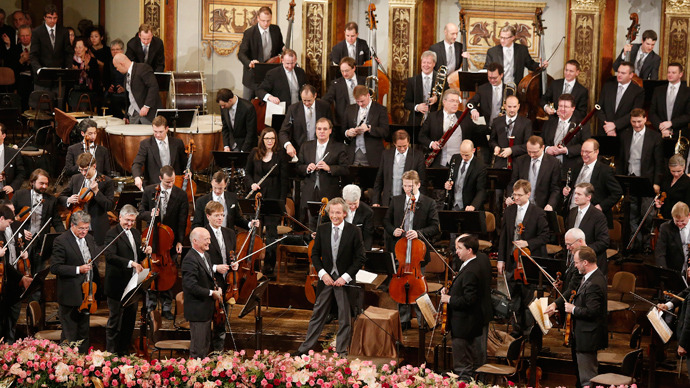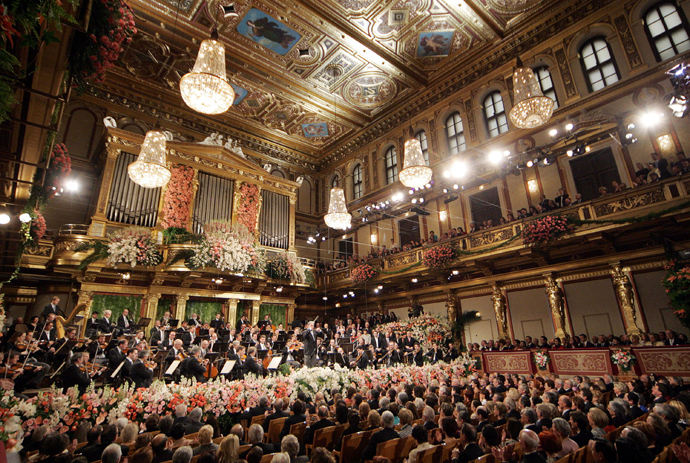Vienna Philharmonic Orchestra admits links with Nazis

The world famous Vienna Philharmonic Orchestra has admitted that many of its musicians were Nazi party members in the 1930s and 40s and drove out Jewish members who were sent to death camps.
The Vienna Philharmonic is best known for its New Year’s Concert, a Strauss Waltz extravaganza, which is broadcast to 50 million people in 80 countries. Its image is closely associated with the 18th century Vienna of Hayden, Beethoven and Mozart and is one of the Austrian capitals biggest tourist attractions.
What has only just been revealed is its shadier Nazi-associated
past.
Thus, the famous New Year concert originated in 1939 to be used by the Nazis as a propaganda instrument, while of the orchestra’s 123 members in 1942, 60 belonged to the Nazi party and two were members of the SS.
The orchestra has also published online a report on who received its rings of honor and medals, which traditionally had been given to artists but during Nazi rule were given to high ranking officials and military leaders.
The list included Baldur von Schirach, the Nazi governor of Vienna, who was awarded the ring in 1942. Schirach ordered the deportation of tens of thousands of Jews to concentration camps and was sentenced to 20 years in jail during the Nuremburg trials after the war.
In one of the articles posted on the orchestra’s website on Sunday it was revealed by the historian Oliver Rathkolb that a replacement ring was given to Schirach after he was released from prison in 1967.
Clemens Hellsberg, the Philharmonic’s current chairman, told Reuters that the orchestra has not yet made a decision on whether to revoke awards handed out during the Nazi period.
Details of 13 musicians who were driven out of the orchestra for their Jewish origin or relations, five of whom died in concentration camps, were also published on the website for the first time.
The conductor, Joseph Kripps, whose father was Jewish, was forced to leave the orchestra and work in a food factory but was welcomed back in 1945 at the end of the war.
Bernadette Mayrhofer, an independent historian from the University of Vienna, believes that the ostracism of Jewish musicians had begun even before the 1938 Anschluss with Germany, under a harsh period of authoritarian rule in Austria known as Austrofascism.
“It was known whether someone had Jewish roots or a Jewish wife,” she told Reuters.
The unfortunate history of the orchestra, has only surfaced gradually, as until the recent findings were published online, the secrets of the Philharmonic’s archives have only been seen selectively by a handful of commissioned historians.
The Vienna Philharmonic has said it is not obliged to give public access to its archives, since it is a private organization.
A history of the Vienna Philharmonic, ‘Democracy of Kings’, published in 1992 by the now chairman Hellsberg, did not mention many of the uncomfortable facts now coming to light on the website.

Hellsberg, talking at the preview of a documentary by Austrian state broadcaster ORF, about the orchestra’s Nazi era history, said that the orchestra had been quietly working through its history for decades and now needed to give a proper account of itself.
Harald Walser, an Austrian Greens member of parliament, one of the Philharmonic’s most vocal critics, said he welcomed the orchestra’s move but wanted it to go further.
“It’s a step in the right direction. But we’re still a long way from having adequate access to the archives,” he said.
Fitz Truempi, one of the historians commissioned by the orchestra to write the articles on its website, said it took him three years to get access to the archives to research an earlier book, Politicized Orchestra, a study of the Vienna and Berlin Philharmonics under National Socialism, published in 2011.
Truempi thinks the orchestra has come to a decision that it’s long held policy of withholding information about its past is no longer protecting but harming its image.
“For a long time, they tried to maintain strict control over their brand but, in the end, the political pressure became such that it was the best solution to open up,” he concludes.
However, in December last year Walser accused the orchestra, of destroying important documents from the World War Two period.
The Philharmonic has also been criticized for being too homogenous. An influential classical music writer, Norman Lebrecht, penned an opinion piece for Bloomberg in January that the orchestra had only six female members and no Asians even through a third of the students from Vienna’s University of Music are Asian.














